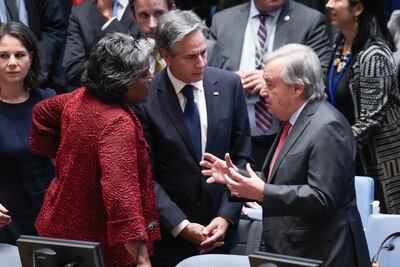The October 7 attack by Hamas and Israel’s subsequent air strikes on Gaza have extracted a cruel price in terms of civilian lives. Although each loss is irreplaceable, Palestinian survivors face a particular challenge as there continues to be constant bombing amid the wreckage in what was already an impoverished, overcrowded and blockaded enclave.
Speaking to The National earlier this week, Naser Mufrej, professor of finance and economics at the Arab American University in Ramallah, said that the economic impact of Israel's continuing air strikes on Gaza is expected to be “tragic and tremendous given the fact that the whole [Gazan] economy now is disabled without any functions”.
Sadly, the economic outlook for the territory was grim even before October 7 and the latest conflict is expected to only exacerbate the situation, with unemployment and poverty rising among the beleaguered enclave’s 2.3 million people. Prof Mufrej said that the total gross domestic product of Gaza “is estimated at around $4 billion to $5 billion and we are talking about GDP [loss] per day of about $14 million to $20 million”. The latest bombardment by the Israeli military also leaves Gazans “with no income, with no work almost, and with no food,” he said. In addition, the 16-year Israeli blockade has hit people’s savings, Prof Mufrej added.

He is right to highlight this important context. Gazans’ plight did not begin on October 7, and the chronic nature of their predicament was alluded to by UN Secretary General Antonio Guterres on Tuesday when he told the Security Council that the Hamas attacks "did not happen in a vacuum" because the Palestinian people have been “subjected to 56 years of suffocating occupation".
“They have seen their land steadily devoured by settlements and plagued by violence; their economy stifled; their people displaced; and their homes demolished,” he added.
Mr Guterres’s remarks ought to be considered unremarkable, but they were met with a strong rebuke from Israeli Foreign Minister Eli Cohen. Mr Guterres addressed that criticism in an address on Wednesday, stressing that his pointing out of the problems of occupation did not in any way justify Hamas’s actions. And while the Hamas tactic of killing and kidnapping civilians is indeed abhorrent, and the militants bear responsibility for their own actions, the International Monetary Fund and the World Bank have released report after report detailing how military occupation in the West Bank and near total Israeli control of Gaza’s borders have led to severe economic hardship for generations of Palestinians. These findings have been joined by yesterday’s report from the UN Conference on Trade and Development that said, before this current crisis, a “decades-long blockade hollowed Gaza’s economy, leaving 80 per cent of the population dependent on international aid”.
The prolonged despair and helplessness created by years of being unable to make ends meet or plan for a better future can only be guessed, not felt. On Monday, former US president Barack Obama – a supporter of Israel – described people in Gaza as a “captive civilian population” and said Israel’s decision to cut off food, water and power to the enclave “could further harden Palestinian attitudes for generations, erode global support for Israel, play into the hands of Israel’s enemies, and undermine long-term efforts to achieve peace and stability in the region”.
No matter how this current phase of the Palestinian-Israeli conflict ends, Gaza and the West Bank will need years of help to rebuild, let alone develop a functional, independent economy. Although human lives cannot be replaced, creating a situation where people can work, provide for their families and feel some measure of dignity would go some way to achieving the stability Mr Obama referred to. The mechanics of organising this must start now.


